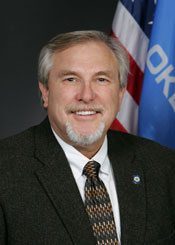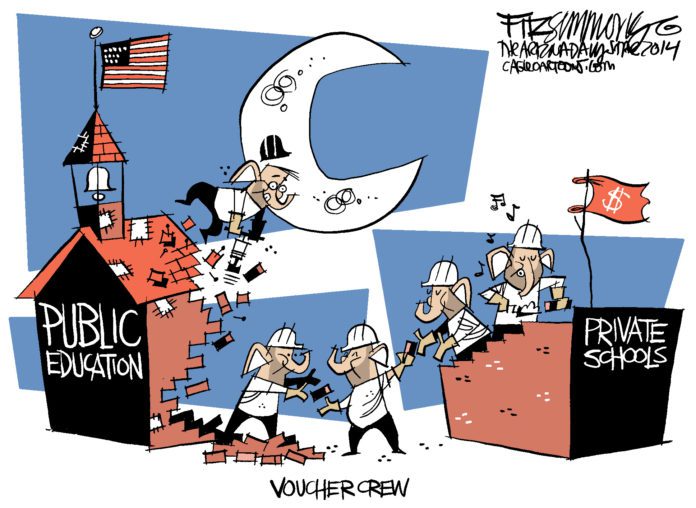BY DAVID PERRYMAN
 Most Oklahomans don’t want public tax dollars to be used for private and religious schools. That has pretty much been a part of the American mindset since our country was established.
Most Oklahomans don’t want public tax dollars to be used for private and religious schools. That has pretty much been a part of the American mindset since our country was established.
In fact, when Oklahoma’s original constitution was adopted, it contained the following language in Article Two, Section Five: “No public money or property shall ever be appropriated, applied, donated, or used, directly or indirectly, for the use, benefit, or support of any sect, church, denomination, or system of religion, or for the use, benefit, or support of any priest, preacher, minister, or other religious teacher or dignitary, or sectarian institution as such.”
This year, on Nov. 8, if a majority of Oklahomans who go to the polls vote “yes” on SQ 790, that 109-year-old language will be stricken from the Oklahoma Constitution. The language is relatively straightforward and will have broad sweeping consequences if it is deleted from the supreme law of our state.
Oklahomans are pretty logical when they are asked a direct question and given a little time to think about it. In this case, the direct question is: “Do you want religious organizations, regardless of who or what they worship, to be eligible to use or receive public property, tax dollars or other public money for their benefit or support?”
Unfortunately, anecdotal stories that prey on our emotions and are not based on evidence are often used to divert our attention from the real motivating factors.
Oklahomans have been told that SQ 790 is on the ballot to allow the Ten Commandments monument to be legally placed on the grounds of the Oklahoma Capitol building.
Plain and simple, SQ 790 is on the ballot to benefit people who want to divert public education dollars to pay for tuition in private and religious schools through the use of vouchers and Education Savings Accounts [ESA].
If the purpose of SQ 790 was honestly about the Ten Commandments, the pro-voucher groups behind this state question could have simply added the following phrase to the existing constitutional language, “ … provided, nothing in this section shall prevent a Ten Commandments monument from being placed on the grounds of the Oklahoma State Capitol.”
However, instead of adding that language and protecting our state treasury and public property, the proponents ignored this alternative when it was offered during the legislative process and chose to proceed with eliminating the protection that Oklahomans have had for nearly 110 years. When the dust settled, it was abundantly clear that SQ 790 has nothing to do with the Ten Commandments.
My parents taught me that “what is good for the goose is good for the gander.” My eighth grade civics teacher taught me that no one should be above the law. Later, I learned that the “rule of law” demanded this premise. We cannot grant special privileges to some religious groups and not to others. How broadly do we want to allow our tax dollars or public property to be used for religious purposes? Are there any limits on the “systems of religion” that will get in line for their share of the public treasury?
We often speak about the foresight of our nation’s founding fathers, but it seems that the men who drafted Oklahoma’s Constitution were blessed with some of that same wisdom. Article II, Section 5 is intended to protect our tax dollars and our public property for generations. It has served us well and will continue to do so if we allow it to stand.
– David Perryman, a Chickasha Democrat, represents District 56 in the Oklahoma House







